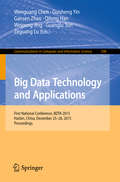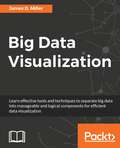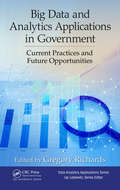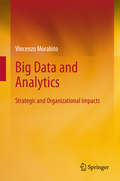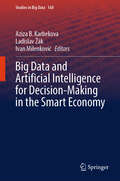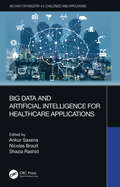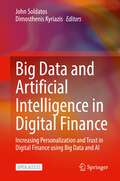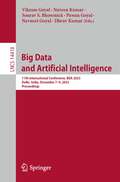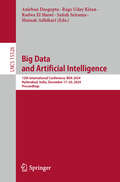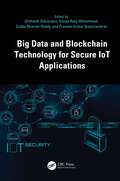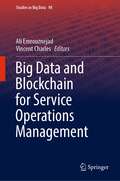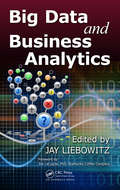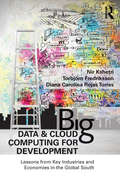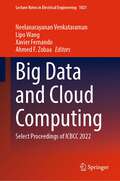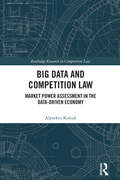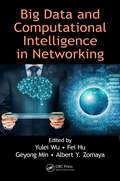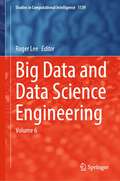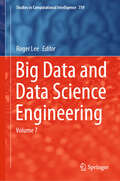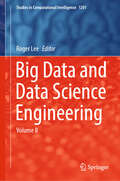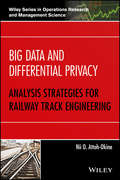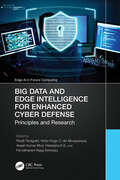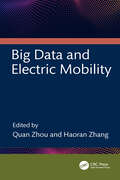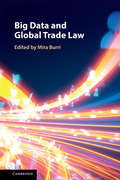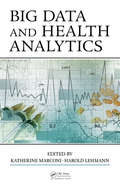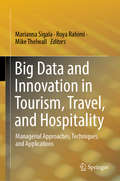- Table View
- List View
Big Data Technology and Applications: First National Conference, BDTA 2015, Harbin, China, December 25-26, 2015. Proceedings (Communications in Computer and Information Science #590)
by Qilong Han Weipeng Jing Guanglu Sun Zeguang Lu Wenguang Chen Guisheng Yin Gansen ZhaoThis bookconstitutes the refereed proceedings of the First National Conference on BigData Technology and Applications, BDTA 2015, held in Harbin, China, in December2015. The 26revised papers presented were carefully reviewed and selected from numeroussubmissions. The papers address issues such as the storage technology of Big Data;analysis of Big Data and data mining; visualization of Big Data; the parallelcomputing framework under Big Data; the architecture and basic theory of BigData; collection and preprocessing of Big Data; innovative applications in someareas, such as internet of things and cloud computing.
Big Data Visualization
by James MillerThis book is for data analysts or those with a basic knowledge of big data analysis who want to learn big data visualization in order to make their analysis more useful. You need sufficient knowledge of big data platform tools such as Hadoop and also some experience with programming languages such as R. This book will be great for those who are familiar with conventional data visualizations and now want to widen their horizon by exploring big data visualizations.
Big Data and Analytics Applications in Government: Current Practices and Future Opportunities (Data Analytics Applications)
by Gregory RichardsWithin this context, big data analytics (BDA) can be an important tool given that many analytic techniques within the big data world have been created specifically to deal with complexity and rapidly changing conditions. The important task for public sector organizations is to liberate analytics from narrow scientific silos and expand it across internally to reap maximum benefit across their portfolios of programs. This book highlights contextual factors important to better situating the use of BDA within government organizations and demonstrates the wide range of applications of different BDA techniques. It emphasizes the importance of leadership and organizational practices that can improve performance. It explains that BDA initiatives should not be bolted on but should be integrated into the organization’s performance management processes. Equally important, the book includes chapters that demonstrate the diversity of factors that need to be managed to launch and sustain BDA initiatives in public sector organizations.
Big Data and Analytics: Strategic and Organizational Impacts
by Vincenzo MorabitoThis book presents and discusses the main strategic and organizational challenges posed by Big Data and analytics in a manner relevant to both practitioners and scholars. The first part of the book analyzes strategic issues relating to the growing relevance of Big Data and analytics for competitive advantage, which is also attributable to empowerment of activities such as consumer profiling, market segmentation, and development of new products or services. Detailed consideration is also given to the strategic impact of Big Data and analytics on innovation in domains such as government and education and to Big Data-driven business models. The second part of the book addresses the impact of Big Data and analytics on management and organizations, focusing on challenges for governance, evaluation, and change management, while the concluding part reviews real examples of Big Data and analytics innovation at the global level. The text is supported by informative illustrations and case studies, so that practitioners can use the book as a toolbox to improve understanding and exploit business opportunities related to Big Data and analytics.
Big Data and Artificial Intelligence for Decision-Making in the Smart Economy (Studies in Big Data #168)
by Aziza B. Karbekova Ladislav Žák Ivan MilenkovićThis book focuses on the systemic scientific-methodological and practical exploration of organizational-technical and socio-economic issues related to the automation of decision-making in the smart economy under Industry 4.0 using big data and artificial intelligence (AI). The scientific novelty of the results presented in the book lies in uncovering the “black box” of decision-making automation in the smart economy through these technologies. The book clarifies the role and significance of big data and AI in decision-making within the smart economy, highlighting its fundamental importance. Additionally, the book thoroughly discusses international experiences in decision-making automation in the smart economy, with examples from Armenia, Kyrgyzstan, and other Central Asian countries, demonstrating its empirical value. The book reveals advanced organizational-economic models for decision-making based on big data and AI. It also presents the latest trends in the development of the smart economy using big data and AI. Moreover, the book explains the socio-ecological and legal aspects of the ethics in applying big data and AI technologies. Additionally, the book proposes prospective applied solutions for decision-making in the smart economy based on big data and AI. The target audience of the book includes scientists studying big data and AI.
Big Data and Artificial Intelligence for Healthcare Applications (Big Data for Industry 4.0)
by Ankur Saxena, Nicolas Brault, and Shazia RashidThis book covers a wide range of topics on the role of Artificial Intelligence, Machine Learning, and Big Data for healthcare applications and deals with the ethical issues and concerns associated with it. This book explores the applications in different areas of healthcare and highlights the current research. The book covers healthcare big data analytics, mobile health and personalized medicine, clinical trial data management and presents how Artificial Intelligence can be used for early disease diagnosis prediction and prognosis. It also offers some case studies that describes the application of Artificial Intelligence and Machine Learning in healthcare. This book will be useful for researchers, healthcare professionals, data scientists, systems engineers, students, programmers, clinicians, and policymakers.
Big Data and Artificial Intelligence in Digital Finance: Increasing Personalization and Trust in Digital Finance using Big Data and AI
by John Soldatos Dimosthenis KyriazisThis open access book presents how cutting-edge digital technologies like Big Data, Machine Learning, Artificial Intelligence (AI), and Blockchain are set to disrupt the financial sector. The book illustrates how recent advances in these technologies facilitate banks, FinTech, and financial institutions to collect, process, analyze, and fully leverage the very large amounts of data that are nowadays produced and exchanged in the sector. To this end, the book also describes some more the most popular Big Data, AI and Blockchain applications in the sector, including novel applications in the areas of Know Your Customer (KYC), Personalized Wealth Management and Asset Management, Portfolio Risk Assessment, as well as variety of novel Usage-based Insurance applications based on Internet-of-Things data. Most of the presented applications have been developed, deployed and validated in real-life digital finance settings in the context of the European Commission funded INFINITECH project, which is a flagship innovation initiative for Big Data and AI in digital finance. This book is ideal for researchers and practitioners in Big Data, AI, banking and digital finance.
Big Data and Artificial Intelligence: 11th International Conference, BDA 2023, Delhi, India, December 7–9, 2023, Proceedings (Lecture Notes in Computer Science #14418)
by Naveen Kumar Sourav S. Bhowmick Dhruv Kumar Vikram Goyal Pawan Goyal Navneet GoyalThis book constitutes the proceedings of the 11th International Conference on Big Data and Artificial Intelligence, BDA 2023, held in Delhi, India, during December 7–9, 2023. The17 full papers presented in this volume were carefully reviewed and selected from 67 submissions. The papers are organized in the following topical sections: Keynote Lectures, Artificial Intelligence in Healthcare, Large Language Models, Data Analytics for Low Resource Domains, Artificial Intelligence for Innovative Applications and Potpourri.
Big Data and Artificial Intelligence: 12th International Conference, BDA 2024, Hyderabad, India, December 17–20, 2024, Proceedings (Lecture Notes in Computer Science #15526)
by Anirban Dasgupta Rage Uday Kiran Radwa El Shawi Satish Srirama Mainak AdhikariThis book constitutes the proceedings of the 12th International Conference on Big Data and Artificial Intelligence, BDA 2024, held in Hyderabad, India, during December 17–20, 2024. The 16 full papers and 12 short papers presented here were carefully reviewed and selected from 106 submissions. These papers have been categorized under the following topical sections: Image Classification; Graph Analytics; Big Data Analytics; Applications; Data Science; Health-Care Analytics; eLearning; Prediction and Forecasting.
Big Data and Blockchain Technology for Secure IoT Applications (Advances in Digital Technologies for Smart Applications)
by Shitharth Selvarajan Gouse Baig Mohammad Sadda Bharath Reddy Balachandran Praveen KumarBig Data and Blockchain Technology for Secure IoT Applications presents a comprehensive exploration of the intersection between two transformative technologies: big data and blockchain, and their integration into securing Internet of Things (IoT) applications. As the IoT landscape continues to expand rapidly, the need for robust security measures becomes paramount to safeguard sensitive data and ensure the integrity of connected devices. This book delves into the synergistic potential of leveraging big data analytics and blockchain’s decentralized ledger system to fortify IoT ecosystems against various cyber threats, ranging from data breaches to unauthorized access. Within this groundbreaking text, readers will uncover the foundational principles underpinning big data analytics and blockchain technology, along with their respective roles in enhancing IoT security. Through insightful case studies and practical examples, this book illustrates how organizations across diverse industries can harness the power of these technologies to mitigate risks and bolster trust in IoT deployments. From real‑time monitoring and anomaly detection to immutable data storage and tamper‑proof transactions, the integration of big data and blockchain offers a robust framework for establishing secure, transparent, and scalable IoT infrastructures. Furthermore, this book serves as a valuable resource for researchers, practitioners, and policymakers seeking to navigate the complexities of IoT security. By bridging the gap between theory and application, this book equips readers with the knowledge and tools necessary to navigate the evolving landscape of interconnected devices while safeguarding against emerging cyber threats. With contributions from leading experts in the field, it offers a forward‑thinking perspective on harnessing the transformative potential of big data and blockchain to realize the full promise of the IoT securely.
Big Data and Blockchain for Service Operations Management (Studies in Big Data #98)
by Ali Emrouznejad Vincent CharlesThis book aims to provide the necessary background to work with big data blockchain by introducing some novel applications in service operations for both academics and interested practitioners, and to benefit society, industry, academia, and government. Presenting applications in a variety of industries, this book intends to cover theory, research, development, and applications of big data and blockchain, as embedded in the fields of mathematics, engineering, computer science, physics, economics, business, management, and life sciences, to help service operations management.
Big Data and Business Analytics
by Jay Liebowitz"The chapters in this volume offer useful case studies, technical roadmaps, lessons learned, and a few prescriptions todo this, avoid that.'"-From the Foreword by Joe LaCugna, Ph.D., Enterprise Analytics and Business Intelligence, Starbucks Coffee CompanyWith the growing barrage of "big data," it becomes vitally important for organizations to mak
Big Data and Cloud Computing for Development: Lessons from Key Industries and Economies in the Global South
by Nir Kshetri Diana Carolina Rojas Torres Torbjörn FredrikssonThis book provides a framework for evaluating big data and cloud computing based on how they evolve to fit users’ needs in developing countries in key areas, such as agriculture and education. The authors discuss how this framework can be utilized by businesses, governments, and consumers to accelerate economic growth and overcome information and communication barriers. By examining the ways in which cloud computing can drive social, economic, and environmental transformation, readers gain a nuanced understanding of the opportunities and challenges these technologies offer. The authors also provide an authoritative and up-to-date account of big data’s diffusion into a wide range of developing economies, such as Brazil and China, illustrating key concepts through in-depth case studies. Special attention is paid to economic development in the context of the new Sustainable Development Goals formulated by the United Nations, introducing readers to the most modern standard of economic evaluation. Students of information management, entrepreneurship, and development, as well as policy makers, researchers, and practitioners, will find Big Data and Cloud Computing for Development an interesting read and a useful reference source.
Big Data and Cloud Computing: Select Proceedings of ICBCC 2022 (Lecture Notes in Electrical Engineering #1021)
by Ahmed F. Zobaa Xavier Fernando Lipo Wang Neelanarayanan VenkataramanThe book presents papers from the 7th International Conference on Big Data and Cloud Computing Challenges (ICBCC 2022). The book includes high-quality, original research on various aspects of big data and cloud computing, offering perspectives from the industrial and research communities on addressing the current challenges in the field. This book discusses key issues and highlights recent advances in a single broad topic applicable to different sub-fields by exploring various multidisciplinary technologies. This book supports the transfer of vital knowledge to next-generation researchers, students, and practitioners in academia and industry.
Big Data and Competition Law: Market Power Assessment in the Data-Driven Economy (Routledge Research in Competition Law)
by Alptekin KoksalRecent studies on competition law and digital markets reveal that accumulating personal information through data collection and acquisition methods benefits consumers considerably. Free of charge, fast and personalised services and products are offered to consumers online. Collected data is now an indispensable part of online businesses to the point that a new economy, a data-driven sector, has emerged. Many markets such as the social network, search engine, online advertising and e-commerce are regarded as data-driven markets in which the utilisation of Big Data is a requisite for the success of operations. However, the accumulation and use of data brings competition law concerns as they contribute to market power in the online world, resulting in a few technology giants gaining unprecedented market power due to the Big Data accumulation, indirect network effects and the creation of online ecosystems. As technology giants have billions of consumers worldwide, data-driven markets are truly global. In these data-driven markets, technology giants abuse their dominant positions, but existing competition law tools seem ineffective in addressing market power and assessing abusive behaviour related to Big Data. This book argues that a novel approach to the data-driven sector must be developed through the application of competition law rules to address this. It argues that current and potential conflicts can be mitigated by extending the competition law assessment beyond the current competition law tools to offer a modernised and unified approach to the Big Data–related competition issues. Promoting new legal tests for addressing the market power of technology giants and assessing abusive behaviour in data-driven markets, this book advocates for cooperation between competition and data protection authorities. It will be of interest to students, academics and practitioners with an interest in competition law and data protection.
Big Data and Computational Intelligence in Networking
by Albert Y. Zomaya Yulei Wu Fei Hu Geyong MinThis book presents state-of-the-art solutions to the theoretical and practical challenges stemming from the leverage of big data and its computational intelligence in supporting smart network operation, management, and optimization. In particular, the technical focus covers the comprehensive understanding of network big data, efficient collection and management of network big data, distributed and scalable online analytics for network big data, and emerging applications of network big data for computational intelligence.
Big Data and Data Science Engineering: Volume 6 (Studies in Computational Intelligence #1139)
by Roger LeeThe book reports state-of-the-art results in Big Data and Data Science Engineering in both printed and electronic form. Studies in Computation Intelligence (SCI) has grown into the most comprehensive computational intelligence research forum available in the world. This book publishes original papers on both theory and practice that address foundations, state-of-the-art problems and solutions, and crucial challenges.
Big Data and Data Science Engineering: Volume 7 (Studies in Computational Intelligence #759)
by Roger LeeThis book reports state-of-the-art results in Big Data and Data Science Engineering in both printed and electronic form. Studies in Computation Intelligence (SCI) has grown into the most comprehensive computational intelligence research forum available in the world. This book publishes original papers on both theory and practice that address foundations, state-of-the-art problems and solutions, and crucial challenges.
Big Data and Data Science Engineering: Volume 8 (Studies in Computational Intelligence #1201)
by Roger LeeThis book reports state-of-the-art results in big data and data science engineering in both printed and electronic forms. Studies in computation intelligence (SCI) has grown into the most comprehensive computational intelligence research forum available in the world. This book publishes original papers on both theory and practice that address foundations, state-of-the-art problems and solutions, and crucial challenges.
Big Data and Differential Privacy: Analysis Strategies for Railway Track Engineering
by Nii O. Attoh-OkineA comprehensive introduction to the theory and practice of contemporary data science analysis for railway track engineering Featuring a practical introduction to state-of-the-art data analysis for railway track engineering, Big Data and Differential Privacy: Analysis Strategies for Railway Track Engineering addresses common issues with the implementation of big data applications while exploring the limitations, advantages, and disadvantages of more conventional methods. In addition, the book provides a unifying approach to analyzing large volumes of data in railway track engineering using an array of proven methods and software technologies. Dr. Attoh-Okine considers some of today’s most notable applications and implementations and highlights when a particular method or algorithm is most appropriate. Throughout, the book presents numerous real-world examples to illustrate the latest railway engineering big data applications of predictive analytics, such as the Union Pacific Railroad’s use of big data to reduce train derailments, increase the velocity of shipments, and reduce emissions. In addition to providing an overview of the latest software tools used to analyze the large amount of data obtained by railways, Big Data and Differential Privacy: Analysis Strategies for Railway Track Engineering: • Features a unified framework for handling large volumes of data in railway track engineering using predictive analytics, machine learning, and data mining • Explores issues of big data and differential privacy and discusses the various advantages and disadvantages of more conventional data analysis techniques • Implements big data applications while addressing common issues in railway track maintenance • Explores the advantages and pitfalls of data analysis software such as R and Spark, as well as the Apache™ Hadoop® data collection database and its popular implementation MapReduce Big Data and Differential Privacy is a valuable resource for researchers and professionals in transportation science, railway track engineering, design engineering, operations research, and railway planning and management. The book is also appropriate for graduate courses on data analysis and data mining, transportation science, operations research, and infrastructure management. NII ATTOH-OKINE, PhD, PE is Professor in the Department of Civil and Environmental Engineering at the University of Delaware. The author of over 70 journal articles, his main areas of research include big data and data science; computational intelligence; graphical models and belief functions; civil infrastructure systems; image and signal processing; resilience engineering; and railway track analysis. Dr. Attoh-Okine has edited five books in the areas of computational intelligence, infrastructure systems and has served as an Associate Editor of various ASCE and IEEE journals.
Big Data and Edge Intelligence for Enhanced Cyber Defense: Principles and Research (ISSN)
by Akash Kumar Bhoi Ranjit Panigrahi Albuquerque, Victor Hugo C. de K. S. Hareesha Parvathaneni Naga SrinivasuAn unfortunate outcome of the growth of the Internet and mobile technologies has been the challenge of countering cybercrime. This book introduces and explains the latest trends and techniques of edge artificial intelligence (EdgeAI) intended to help cyber security experts design robust cyber defense systems (CDS), including host-based and network-based intrusion detection system and digital forensic intelligence. This book discusses the direct confluence of EdgeAI with big data, as well as demonstrating detailed reviews of recent cyber threats and their countermeasure. It provides computational intelligence techniques and automated reasoning models capable of fast training and timely data processing of cyber security big data, in addition to other basic information related to network security. In addition, it provides a brief overview of modern cyber security threats and outlines the advantages of using EdgeAI to counter these threats, as well as exploring various cyber defense mechanisms (CDM) based on detection type and approaches. Specific challenging areas pertaining to cyber defense through EdgeAI, such as improving digital forensic intelligence, proactive and adaptive defense of network infrastructure, and bio-inspired CDM, are also discussed. This book is intended as a reference for academics and students in the field of network and cybersecurity, particularly on the topics of intrusion detection systems, smart grid, EdgeAI, and bio-inspired cyber defense principles. The front-line EdgeAI techniques discussed will also be of use to cybersecurity engineers in their work enhancing cyber defense systems.
Big Data and Electric Mobility
by Haoran Zhang Quan ZhouThis book details how to assess electric mobility characteristics within electric vehicles, discussing energy management methods, automated systems, and the enormous potential of data resources mined from software, navigation systems, and connectivity.Big Data and Electric Mobility presents methods to mine data specifically for electric vehicles, to comprehend their performance and to present opportunities to develop data-driven technological advancements. Including contributions from experts across the world, the book will look at topics such as human mobile behavior, battery charging and health, powertrain simulation, energy management, and multiphysics-constrained optimal charging.The book will be key reading for researchers and engineers in the fields of automotive engineering, electrical engineering, and data mining.
Big Data and Global Trade Law
by Mira BurriThis collection explores the relevance of global trade law for data, big data and cross-border data flows. Contributing authors from different disciplines including law, economics and political science analyze developments at the World Trade Organization and in preferential trade venues by asking what future-oriented models for data governance are available and viable in the area of trade law and policy. The collection paints the broad picture of the interaction between digital technologies and trade regulation as well as provides in-depth analyses of critical to the data-driven economy issues, such as privacy and AI, and different countries' perspectives. This title is also available as Open Access on Cambridge Core.
Big Data and Health Analytics
by Katherine Marconi Harold LehmannThis book provides frameworks, use cases, and examples that illustrate the role of big data and analytics in modern health care, including how public health information can inform health delivery. Written for health care professionals and executives, this book presents the current thinking of academic and industry researchers and leaders from around the world. Using non-technical language, it includes case studies that illustrate the business processes that underlie the use of big data and health analytics to improve health care delivery.
Big Data and Innovation in Tourism, Travel, and Hospitality: Managerial Approaches, Techniques, and Applications
by Marianna Sigala Roya Rahimi Mike ThelwallThis book brings together multi-disciplinary research and practical evidence about the role and exploitation of big data in driving and supporting innovation in tourism. It also provides a consolidated framework and roadmap summarising the major issues that both researchers and practitioners have to address for effective big data innovation.The book proposes a process-based model to identify and implement big data innovation strategies in tourism. This process framework consists of four major parts: 1) inputs required for big data innovation; 2) processes required to implement big data innovation; 3) outcomes of big data innovation; and 4) contextual factors influencing big data exploitation and advances in big data exploitation for business innovation.
